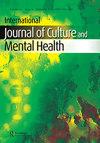自我效能、金钱态度与心理健康的关系:马斯洛需求层次理论的中介作用
Q1 Social Sciences
International Journal of Culture and Mental Health
Pub Date : 2017-04-25
DOI:10.1080/17542863.2017.1314517
引用次数: 5
摘要
虽然文献已经反映了心理和生理需求的满足、自我效能感和金钱态度与心理健康的关系,但尚未研究自我效能感和金钱态度是否通过需求满足影响心理健康。本研究旨在探讨马斯洛需求层次理论在自我效能感、金钱态度与心理健康关系中的中介作用。本研究采用相关性研究设计。采用整群抽样的方法,随机抽取296名参与者。采用相关检验和结构方程模型对样本进行数据分析。结果表明,自我效能感和金钱态度通过需求满足与心理健康相关。研究发现,自我效能感高、金钱忧虑低的个体能够适当地满足自己的需求。结论是,如果在适当的时间和地点满足个人的需求,他们的心理健康将得到改善。本文章由计算机程序翻译,如有差异,请以英文原文为准。
The relationship of self-efficacy and money attitudes with mental health: mediation through Maslow's hierarchy of needs
ABSTRACT Although it has been reflected in the literature that the satisfaction of psychological and physical needs, self-efficacy and money attitudes relate to mental health, it has not been studied whether the self-efficacy and money attitude can affect mental health through satisfaction of needs. The present study was conducted to investigate the mediating effect of Maslow's hierarchy of needs on the relationship of self-efficacy and money attitudes with mental health. This study was a survey with a correlational research design. A total of 296 participants were randomly selected through cluster sampling. The sample was administered the research instruments and the data were analyzed through correlation tests and structural equation modeling. The results revealed that self-efficacy and money attitudes were related to mental health through needs satisfaction. The individuals with higher self-efficacy and lower worry about money were found to be able to properly satisfy their needs. It was concluded that if the individuals’ needs are satisfied in a suitable time and place, their mental health will improve.
求助全文
通过发布文献求助,成功后即可免费获取论文全文。
去求助
来源期刊

International Journal of Culture and Mental Health
Social Sciences-Cultural Studies
CiteScore
2.10
自引率
0.00%
发文量
0
期刊介绍:
This title has ceased (2018). This important peer-review journal provides an innovative forum, both international and multidisciplinary, for addressing cross-cultural issues and mental health. Culture as it comes to bear on mental health is a rapidly expanding area of inquiry and research within psychiatry and psychology, and other related fields such as social work, with important implications for practice in the global context. The journal is an essential resource for health care professionals working in the field of cross-cultural mental health.Readership includes psychiatrists, psychologists, medical anthropologists, medical sociologists, psychiatric nurses and social workers, general practitioners and other mental health professionals interested in the area. The International Journal of Culture and Mental Health publishes original empirical research, review papers and theoretical articles in the fields of cross-cultural psychiatry and psychology. Contributions from the fields of medical anthropology and medical sociology are particularly welcome. A continuing dialogue between members of various disciplines in various fields is encouraged. The aim of the journal is to encourage its readers to think about various issues which have clouded cross-cultural development of ideas. The journal lays special emphasis on developing further links between medical anthropology, medical sociology, clinical psychiatry and psychology, and implications of the findings on service provisions. The journal is published four times a year. The style of reference is Harvard. All research articles in this journal, including those in special issues, special sections or supplements, have undergone rigorous peer review, based on initial editor screening and anonymized refereeing by at least two independent referees.
 求助内容:
求助内容: 应助结果提醒方式:
应助结果提醒方式:


